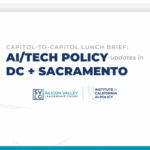At this point, there’s no valid debate on the science behind climate change.
Humans are releasing vast quantities of heat-trapping gases into the atmosphere. Temperatures are rising. And the weather is changing — often drastically. As a result, we’re seeing larger wildfires, longer droughts, bigger storms and worse flooding. The real debate is not about the danger we face, but about how fast we can act.
What do scientists, international institutions, and many world leaders all agree on? They are loud and clear on the fact that time is running out to avoid locking in the worst effects of a rapidly warming world for generations to come.
Message received. The question now is what to do about it.
At the same time that we struggle with passing public policy to address the multiple threats posed by the climate crisis, U.S. business is setting – and meeting – increasingly ambitious climate and clean energy goals. But the reality is that individual, or even collective corporate action, no matter how big, won’t solve the climate crisis. In order to move forward at the speed and scope science is telling us is necessary, we need big policy. The type that can harness the power of the entire market to drive down emissions.

As one of the business organizations at the forefront of addressing our climate crisis – and pushing for action on it – Silicon Valley Leadership Group and our 350 members have advocated for putting a price on climate change pollution for over 15 years. This goes back to our support of the California Global Warming Solutions Act, introduced in 2006. We’re encouraged to see so many in the business community joining us. Over 300 businesses and organizations have come forward to call on the Biden administration to set an ambitious climate change goal that would cut U.S. greenhouse gas emissions by at least 50% below 2005 levels by 2030.
However, this is just the start.
What’s needed now is sound public policy to create a clear and stable business environment for action that supports good jobs and which reduces climate pollution at the pace and scale needed to arrest the accelerating threats from climate change. Because the most powerful tool companies have to fight climate change is their political influence.
Thankfully, this moment offers a unique opportunity. There are currently 5 bills in the Congress that propose to price carbon pollution. Lawmakers on both sides of the aisle, non-profit groups, and business organizations such as the U.S. Chamber of Commerce, Business Roundtable, American Petroleum Institute as well as top financial trade groups all are coming forward to support carbon pricing. There is a lot that needs to be worked out, for sure. Not least of which is what to do with the revenues that would be generated, including: rebating proceeds to the American public; lowering other types of taxes; reducing the federal deficit; targeting assistance to fossil fuel communities; or funding public investments, like those proposed in the American Jobs Plan infrastructure proposal put forward by the Biden Administration. Each of the proposals highlighted above would have vastly different effects on businesses, jobs and overall economic growth.
And that is exactly why we need a broad, bipartisan and public conversation on the subject.
Make no mistake, we are looking at a significant transformation of our economy and changing old ways of doing business. But with that change comes the promise of tremendous upside. The Global Commission on the Economy and Climate recently found that bold action could yield a direct economic gain of US $26 trillion through to 2030 compared with business-as-usual.
This is the time to go big. With each passing year of unabated climate change, the risks mount and the chance to implement solutions slips away. That is why we and the forward-looking companies of our Silicon Valley community stand ready to work to help craft and pass legislation. We look forward to engaging in a meaningful conversation about the best way to advance low-carbon infrastructure, price carbon pollution, and adapt to a rapidly warming world. We need to pivot from the policies of the past and bring to the table new ideas as we reimagine and work toward what we want our future to look like. We believe this is about catalyzing entrepreneurial public policy that encourages government and business investment in targeted areas, job growth, and equity. We can and must craft legislation that addresses both the threats, as well as the opportunities, climate change presents.
Let’s not miss this moment.
++++++++++++++++++++++++++++++++++++++++
SVLG’s Principles for Carbon Pricing Legislation (Put Forward for Discussion)
- Effective and Efficient: Establishes an economy-wide carbon price with regular increases sufficient to ensure the U.S. achieves its 2025 greenhouse gas reduction commitments, and is consistent with the goal of keeping the global temperature increase to below 2 degrees Celsius.
- Promotes Global Business Competitiveness: Supports the competitiveness of businesses across borders and incentivizes comparable carbon pricing by other nations.
- Avoids Redundancy in Regulation of Emissions: Provides a price signal strong enough to reduce the need for redundant regulation of greenhouse gas emissions.
- Flexible: Provides flexibility to adjust policy features and to use complementary policies to ensure emission reduction goals are met.
- Fair & Equitable: Contributes to a fair and equitable transition to affordable and reliable clean energy for affected workers, families, businesses and communities.
- Enable Smooth Transition: Integrates effectively with existing sub-national carbon pricing systems and avoids double taxation for companies and citizens.
- Durable: Catalyzes bi-partisan sponsorship and support.
###
April 22, 2021




